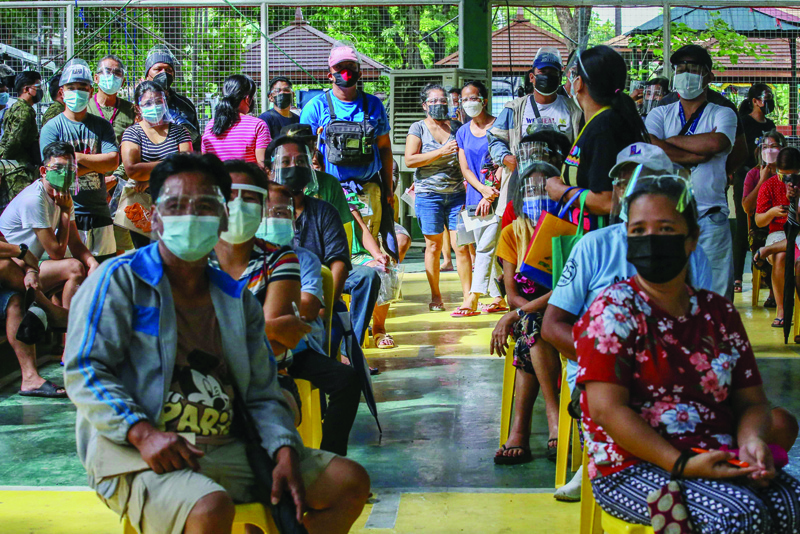 MANILA: People line up to receive cash aid from the national government yesterday. – AFP
MANILA: People line up to receive cash aid from the national government yesterday. – AFP MANILA: Philippine tricycle driver Jesus Gomez struggled to make a living even before the capital Manila went back into a coronavirus lockdown last week that forced most of his customers to stay home and halved his meagre income. Six months behind in rent and unable to afford cooking gas, the 77-year-old joined hundreds of others yesterday at a covered basketball court to receive a thousand peso ($20) government handout.
About 80 percent of the more than 13 million people living in the sprawling national capital region are eligible for the one-off cash payment to ease the economic pain caused by the latest lockdown. "It's a big help because if there's no cash aid I can't buy (cooking) gas," said Gomez, who earns 200 pesos on a good day during lockdown.
Restrictions introduced since the start of the pandemic have shattered the Philippine economy, cost millions of jobs and left many families hungry. A resurgence in infections, partly fueled by the hyper-contagious Delta variant that has torn through neighboring countries, has triggered lockdowns in the capital and other areas.
President Rodrigo Duterte said recently the country could not afford more lockdowns. But with only about 10 percent of the population fully vaccinated and hospitals filling up fast, authorities have few options to slow the spread of the virus. The stricter rules, which include an eight-hour nighttime curfew as well as a ban on restaurant dining and outdoor exercise, are expected to cost the economy about $3 billion a week in lost output.
'Even one peso is important'
Enriqueta Guerrero, 68, said she used to rely on her children to supplement the 100 pesos she earns a day cleaning and cooking for another household. But they have also struggled to make ends meet during the pandemic, she explained as she sat on a plastic chair waiting for her name to be called to collect her cash. "If I don't work, I don't eat," said Guerrero, who plans to use the aid to buy groceries on Sunday, her only day off.
Officials warned Tuesday of economic "speed bumps" ahead, even after data showed gross domestic product rebounded 11.8 percent on-year in the second quarter. It was off a 17 percent slump in the same period last year when the country endured its first crippling lockdown. "Before I could take it fairly easy driving the tricycle, but now even one peso is important," Gomez told AFP, before walking back to his vehicle in the hope of finding a rare customer.
Gomez said he is only allowed to work every second day under rules introduced during the health crisis to ensure drivers have the chance to earn money. But it is not enough. Owing 20,000 pesos to his landlord and facing the threat of eviction from his small apartment, Gomez recently sold his air conditioner to raise money. If necessary, Gomez said he would sell his tricycle to cover his debts. But it would be his "last choice", said Gomez, who plans to keep working into his 80s. - AFP










